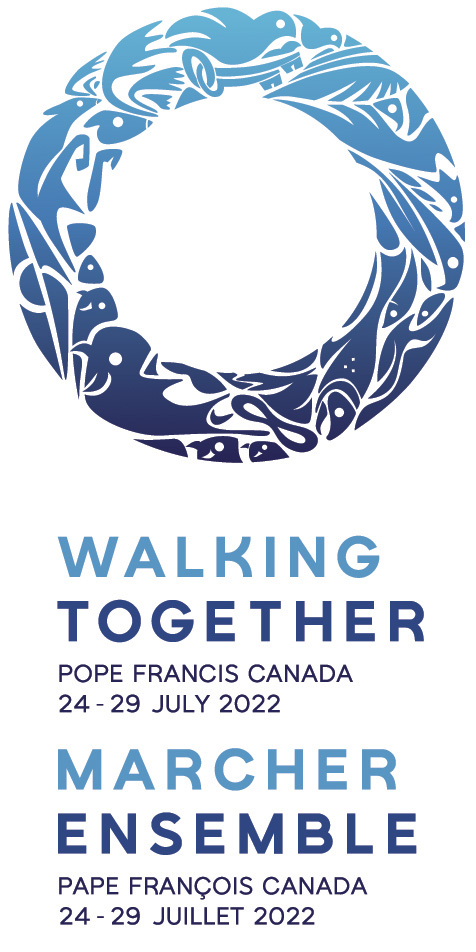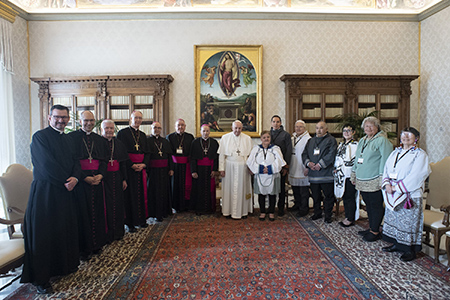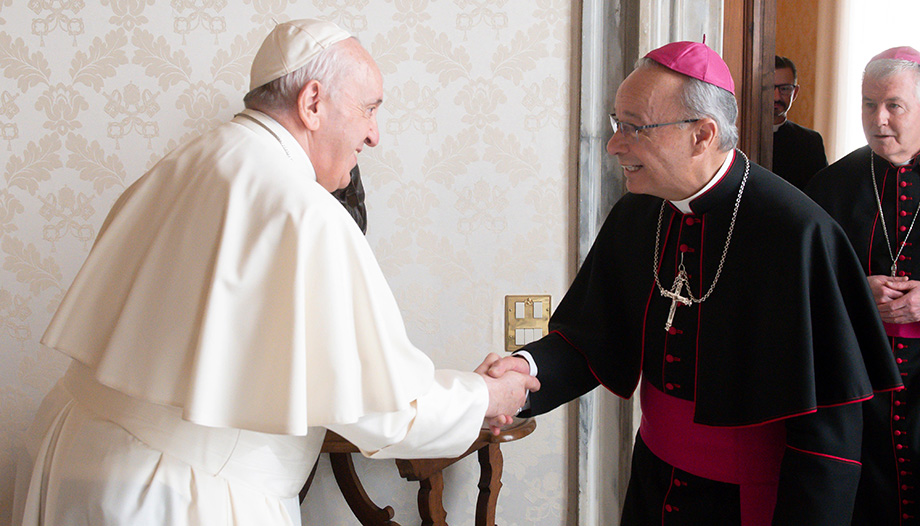It is a historic visit for many reasons. Pope Francis will visit Canada later this July on a very special trip. In addition to listening to and dialoguing with Indigenous peoples, expressing his closeness and addressing the Catholic Church's involvement in the operation of residential schools across Canada, the papal visit will be an opportunity to meet the wider Catholic community in Canada.
A community that, for years, has been immersed in a process of acceptance, forgiveness, but above all, construction of the future as he wanted to emphasize in this interview for Omnes, Raymond Poisson, president of the Canadian Conference of Catholic Bishops.
In this conversation, Bishop Poisson, who is bishop of the diocese of Saint-Jérôme-Mont-Laurier, in the province of Quebec, notes that "the word, the gestures, the presence of the Holy Father will guide us in the direction we must take" on this difficult but necessary path.

How is the Canadian Church preparing for this visit?
- It is a great teamwork with several collaborators, at a national-local level, which must be done in record time.
For more than three years, a group of four bishops has regularly accompanied the initiatives of the bishops of Canada with a view to concrete actions and gestures of reconciliation with our indigenous brothers and sisters. As I am part of this group, I can testify to the journey that led us to organize this meeting in Rome of 3 delegations - First Nations, Inuit and Métis - with Pope Francis (March-April 2022).
These meetings culminated in an audience of more than 150 indigenous delegates with the Holy Father, during which Pope Francis joined the apologies made by the bishops of Canada in September 2021. To follow up on these delegations in Rome, Pope Francis accepted the invitation of his brother bishops. to come to Canada as of July 2022.
National Indigenous peoples' organizations are involved in the planning of the papal visit to Canada. The exchanges began with delegates preparing to travel to the Vatican in March/April 2022 and continued during their private meetings with Pope Francis, as well as with a working group of Canadian bishops in an ongoing dialogue.
The indigenous brothers also participated in pre-visits to potential sites for the papal visit. Programming has been finalized in close collaboration with them to ensure that Pope Francis' upcoming visit will be an important step on the path of healing and reconciliation.
We pray for the health of the Holy Father as we embark on intensive planning for this historic visit.
The preparation for this trip has been, as you point out, very quick. In addition to the "official" preparations, how are the faithful involved in the preparations?
- There are many ways in which the faithful are involved in the preparations for our Holy Father's visit, to rejoice in God's love and to show how we join the Pope in his commitment to healing and reconciliation.
Some parish groups pray together, some volunteer, some travel to attend one of the public events, etc.
This issue affects residential school survivors, but also anyone who has suffered pain or trauma from members of the Catholic Church.
Raymond Poisson. President of the Conference of Catholic Bishops of Canada
The Pope's visit is marked by reports of unedifying behavior of certain church institutions towards the indigenous population. Do you think this visit will mark a turning point in the history of the Canadian Church?
- During the delegations to Rome, we heard the words of Pope Francis, speaking in terms of apologizing to his brother bishops for the behaviors of some members of the Church in residential schools. We know that his visit will be a further step of healing and reconciliation.
This issue affects the survivors of the residential schools, but also anyone who has suffered pain or trauma from members of the Catholic Church. But this visit touches above all on the Church's willingness to live with our indigenous brothers and sisters new projects of reconciliation. Not just apologies.
The Pope's visit may also have a certain liberating effect, which will allow a step towards healing for a large number of victims of different types of abuse, as well as their families of former students, who live the multigenerational impact.
Obviously, not all victims will be appeased, but for many it will be an opportunity to hear and see Pope Francis moved by the testimonies heard.
Aboriginal people attach great importance to relationships, to presence. Hence the importance of having it on Canadian soil and having as many Aboriginal people as possible attend.
This visit touches above all the will of the Church to live with our indigenous brothers and sisters new projects of reconciliation. Not only apologies.
Raymond Poisson. President of the Conference of Catholic Bishops of Canada
In this sense, how do the indigenous population, including non-Catholics, experience this path?
- In general, after two years of pandemic: how good it will be to see each other again in large groups, to be happy to be together!
There is a need to rebuild ties and solidify them, to know and respect each other better, to better understand aboriginal spiritualities, their traditions, to deepen our understanding of truths, to clarify our ways of seeing ourselves.
There are prejudices and stereotypes among us, so walking together, Catholics and other religious denominations with the whole population, will help us create a more united future. The idea is to transform the way we look at each other. This visit is a unique opportunity offered to the whole of Canadian society.

The motto of the visit is "Walking Together", as part of the reconciliation process initiated years ago by the bishops of Canada. How is this process going?
- The delegation to Rome last April follows more than three years of dialogue between Canada's Catholic bishops and their indigenous partners, including the Assembly of First Nations (AFN), the Métis National Council (MNC) and the Inuit Tapiriit Kanatami (ITK), with the goal of learning and discerning how best to support them on the path of healing and reconciliation.
As this dialogue continues, we have taken several important stepss to support a brighter future, including the announcement of $30 million in support for healing and reconciliation initiatives, our commitment to ensuring that documents related to residential schools are available to survivors, and our continued efforts to educate our clergy, consecrated and lay women and men on indigenous cultures and spirituality.
There is a clear consensus among Canadian bishops that more needs to be done to alleviate the historical and current suffering caused by the residential school system.
The Holy Father's trip to Canada will allow us to be together, to walk together, members of Indigenous and non-Indigenous communities. To live together strong events that speak for us, we think it will be beneficial.
The word, the gestures, the presence of the Holy Father will guide us in the direction we must take, will open paths for us to continue walking together towards reconciliation, healing, to have a vision of the future.
Walking together, Catholics and other religious denominations with the entire population, will help us create a more united future. The idea is to transform the way we look at each other.
Raymond Poisson. President of the Conference of Catholic Bishops of Canada
Canada, like the rest of the West, has undergone a major process of secularization. How is the Church in Canada today? How has it lived and is it living this process of purification, which can sometimes be almost incomprehensible?
- The Church as an institution personalizes a whole people on the move; it is a force for action. There is also a danger: the Church should not be limited to consecrated or clerical members but to all the baptized.
Through challenges and controversies, joys and projects, the Church tries to make a central place for Christ, the Gospel and Gospel values. It is made up of human beings and, therefore, is not perfect.
There is a growing importance in society for the authenticity of the witness that this Church, with its pastors and its entire structure, must serve to the core of society. It is also this authenticity, "fidelity to the mission", which is often reproached to the members of the Church in the case of boarding schools.
Through my own membership and participation in the Canadian Conference of Catholic Bishops, I am inspired by wonderful examples of commitment and holiness in the missionary journey of the People of God in Canada. The modern world is full of complexity, but there are also times when the Word of God can take root in society.
As bishops, we rely on all members of the People of God, including clergy, laity and consecrated persons, all the baptized, to give good witness to the Gospel in daily life.








